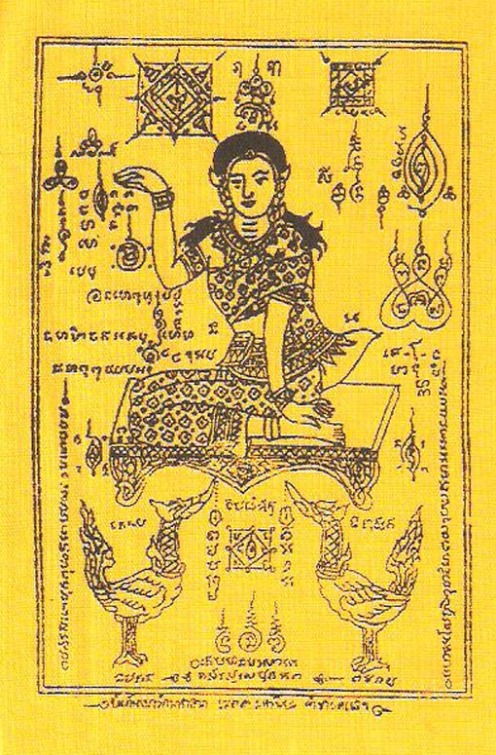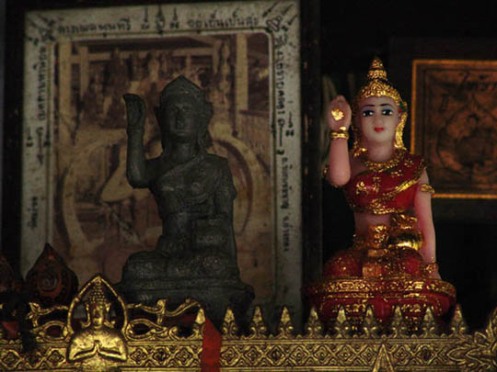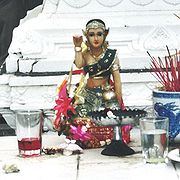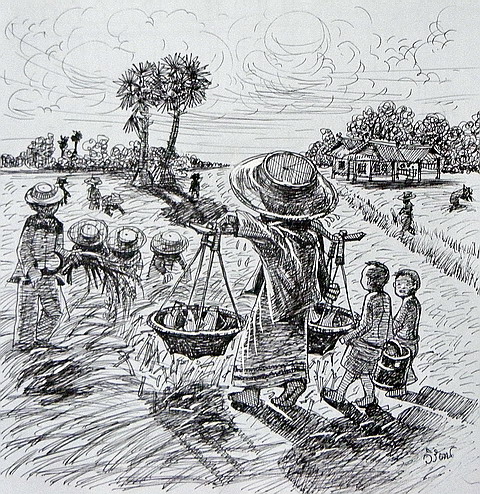คาถานางกวัก Nang Gwak Kata
for Pha Yant, Sak Yant tatttoos and Statues for making Pooja to in the place of business
Kata Nang Gwak is used when paying devotional merits to Nang Gwak, who is used in the place of business to increase the amount of customers and sales you may ingress.Nang gwak is a very popular magic cloth yantra used in most business establishments in Thailand. You can also see nang Gwak worshipped as a statue

Nang Gwak - Nang Supawadee
Kata (Thai)
โอมศรีวิชัยกังเวียน ปู่เจ้าเขาเขียวมีลูกคนเดี่ยว ชื่อนางกวัก ชายเห็นชายรัก หญิงเห็นหญิงทักทุกถ้วนหน้า พวกพาณิชชาพากูไปค้าถึงเมืองแมน กูจะไปค้าหัวแหวน ก็ได้วันละแสนทะนาน กูจะค้าสารพัดการก็ได้โดยคล่อง กูจะค้าทองๆก็ได้มเต็มหาบเพียงวันนี้เป็นร้อย สามหาบมาเรือน สามเดือนเป็นเศรษฐี สามปีเป็นพ่อค้าสำเภา พระฤาษีผู้เป็นเจ้า ประสิทธิ์ให้แก่ลูกคนเดี่ยว สวาหะ
Kata (Phonetic)
Om Sriwichay Gangwian – Phu Jao Khao Khiaw Mii Luuk Kon Diaw Cheu Naang Gwak – Chaay Hen Chaay rak Hying hen Hying tak – Tak Tuan Naa – Puak Paanichaa Paa Guu bpai kaa terng Mueang Maen – Guu ja bpai kaa hua whaen gor dai wan la Saen Tanaan Guu ja kaa saarapadgarn gor dai doey klong – Guu ja kaa tong mv’ dor dai dtem haab piang wan niibpen rooy saam haab ma ruean saam duean bpen saedtii saam bpii bpen Por Kaa Sampao – Pra Rasii Puu bpen Jao bprasit hai gae luuk kon diaw – swaaha.
Use this kata when you are going to sell things, or in your place of business in the morning, you can also chant it into some prayer water and use that to sprinkle over your wares that you are selling too.

Nang Gwak - waving lady
Download Song about Nang Gwak Read about “Who is Nang Gwak?”

The patron saint/Deva of all Merchants
How to make offerings?
One should use 5 incense sticks and offer flowers, red syrup drink (sala flavour, knows as “nam daeng” in Thai), water, and some sweets and rice as offerings.
Light the incense candle and offer the flowers and drinks. Then Say “namoe Dtassa Phakawadtoe Arahadtoe Sammaa Samputtassa 3 times, and bow three times to Buddha before you begin chanting Kata nang Gwak.
Links:
Nang Gwak Lanna – The story of Nang Gwak Pha Yant Nang Gwak
Change the water sweetmeats and flowers every morning when you open shop, and liught new incense too each time.
Posted in Kata and Mantra, Katas for good Business
Tags: นางกวัก, นางสุภาวดี, bucha, kata, nang gwak, pha yant





You must be logged in to post a comment.